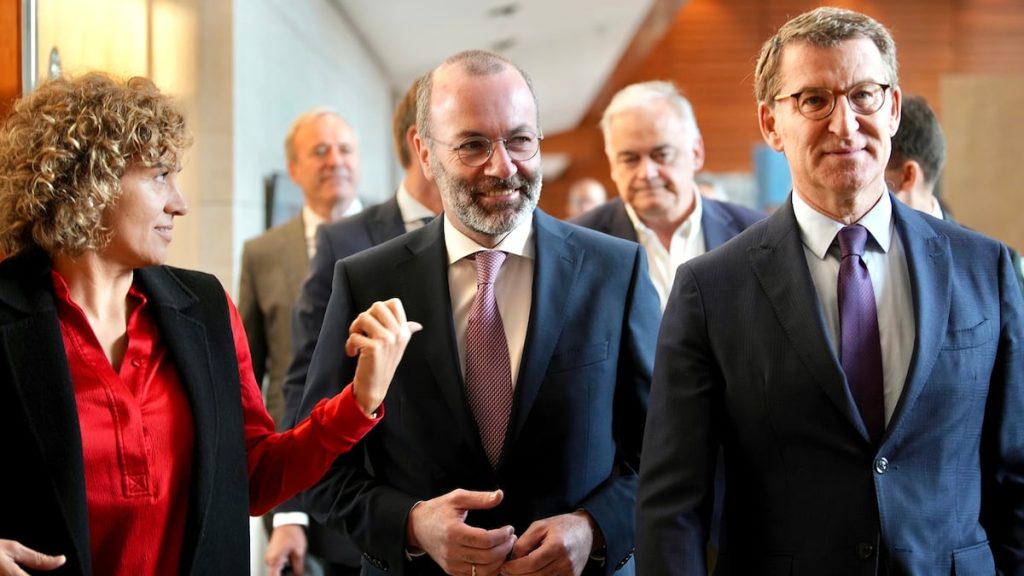The Spanish right has turned the European Parliament into its third major chamber for opposing the government. The Popular Party, Ciudadanos, and Vox used the EU legislative body to attack Pedro Sánchez’s government by bringing national debates to Brussels, such as the amnesty law or the use of Catalan in schools. The coalition parties have even accused the PP of being “disloyal” for putting key packages for Spain at risk, such as the arrival of €163 billion in recovery funds or the approval of the “Iberian exception,” which helped control electricity prices. The party led by Alberto Núñez Feijóo is determined to continue this strategy of wearing down the government in the European capital and has already announced that it will persist with its complaints about amnesty, European funds, and relations with Venezuela.
The mayor of Madrid, José Luis Martínez Almeida, led a delegation of mayors to Brussels in February 2022 to denounce the lack of control mechanisms in the management of recovery funds and an alleged unfair distribution of those resources. The use of European money is a delicate matter, both due to its amount and the resistance shown by Northern countries, especially Berlin and The Hague, to its deployment. Despite this, the complaints of these mayors received little attention from the European Commission. The conservative government led by Ursula von der Leyen only noted the complaints, and a few months later, Spain became the first EU country to receive a second disbursement of funds after fulfilling all its obligations.
The recovery funds, in whose design Spain played a key role, have always been used by the opposition to pressure the government. Ciudadanos fiercely criticized the quality of the Spanish plan, while the PP aligned with Northern countries to demand more conditions for the funds’ delivery. Since then, the Popular Party has continually criticized the money’s management. Just a week ago, Feijóo reiterated this, calling for less bureaucracy and lamenting that the money came from EU public debt. The PP’s main platform in Brussels has been the petitions committee, which any citizen can access. Spain consistently submits the highest number of complaints to this committee each year, accounting for around 17% of the total in 2021 and 2022, far more than Germany, Italy, or Poland. Issues brought to this committee in this legislature include the landing of the Venezuelan vice president at Barajas airport, unsolved ETA murders, a case involving Mònica Oltra’s husband, and language immersion in Catalonia.
Following the amnesty law, the PP decided to escalate its clash with Sánchez to the highest level. The amnesty of those charged for the Catalan independence process was discussed in a high-voltage session at the European Parliament in November of last year. The leader of the European People’s Party (PPE), Manfred Weber, called for a clear reaction from the European Commission to that law. Just three weeks later, Weber met with Sánchez in Strasbourg. Sánchez took the opportunity to criticize the PP for its agreements with Vox, pointing out their elimination of policies against gender violence, censorship of cultural events, and reinstatement of street names linked to the Franco dictatorship. This ongoing war against Sánchez has extended to other figures linked to the PSOE, including the EU High Representative Josep Borrell and Vice President Nadia Calviño.
In response to the German chancellor’s visit to Spain, Feijóo reiterated his call for the EU to “activate” the rule of law in Spain following the approval of the amnesty law. Von der Leyen, who has shown good rapport with Sánchez this term, refrained from commenting on that law specifically but emphasized European values and the rule of law. It appears that the PP will continue its strategy this term, as indicated by proposals in its program such as “independence of the CIS,” changes to EU directives to prevent “ongi etorris,” and reform of the Spanish electoral law to eliminate “trap ballots” used by nationalist parties.


